Without a decent, new iteration of SimCity for me to play, I've been looking high and low for new city simulator games in order to scratch that particular itch. I spent a large chunk of time a few years ago playing Cities XL, but never got around to reviewing it (maybe I'll post a retro-review in the future). Cities XL has so far been the best of the bunch and has a very wide scope, but it's developer has folded, and the game has never truly felt complete.
So I've started looking at more niche titles. I gave Children of the Nile and Caesar IV a go a few years ago, and both were pretty good, but just didn't hold me over for very long. So when Tropico 5 went on sale on Steam, I picked it up and put it on the shelf till I took a break from Civ. The game has also been released on XBox 360, and it has also been announced for a PS4 release sometime in 2015, but I've been playing the PC version.
City simulator with a dictatorial twist
The primary gimmick of the Tropico series is that the player isn't a mayor (as most city simulators claim); instead, you play as a dictator who is granted governorship of a small Caribean island-nation by a European power. It's basically a Cuba-simulator. At the start of a game, you must create a dictator avatar, and that character can have children and heirs in order to maintain your dynasty. From a meta standpoint, this gives much greater justification for the breadth of power that the player has over the development of the city. But this dictatorial theme isn't just a gimmick; the game actually does use it for gameplay purposes.
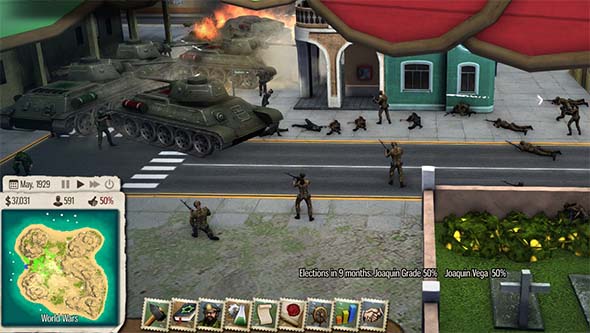
Poor management of relations with internal factions and external nations
can lead to revolts and open warfare on your streets.
In addition to balancing workers versus jobs and various citizen satisfaction metrics, the player also has to worry about maintaining your position of power and dealing on the international stage. Much like the Democracy games, the player actually has to win elections in order to avoid losing the game, and so you must balance the favor of various competing factions. It's nowhere near as deep as Democracy, since there's only about four to six factions (which change depending on the current era), but it does add an extra challenge that a game like SimCity lacks. After all, your mayor-hood in SimCity is indisputable.
It can be hard to manage the favor of these various factions and their members, since it's hard sometimes to tell exactly what is making them happy or unhappy. There is a "Faction" widget that gives you an overview of some of the major things (like constitution options and edicts) that affect a faction's support, but it's hard to tell how your city-planning is affecting them. So election time can be a frustrating and confusing experience, as your approval rating may swing wildly without you necessarily knowing what is causing the change.
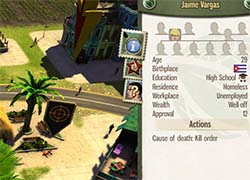
Flex your dictatorial muscles
by killing dissidents.
But if you can't figure out how to make a particular faction or citizen happy, you can always just kill or banish them. After all, you are a dictator! Just be careful that nobody sees you do it, since it could bite you in the ass.
And if things go way south, you might even end up with an armed revolt or foreign invasion. These attacks prevent new buildings from being constructed, can kill citizens, and can destroy buildings. They can also drag on for months due to weird pathfinding issues that sometimes cause troops to do circuits around the city before engaging one another.
And if you lose a military battle, you can't do anything at all (since buildings won't finish building and you can't replenish your troops) except sit and watch the enemy destroy your palace. Or just quit back to the main menu. So you need to make sure that you build your military infrastructure in advance, and then just hope that your military doesn't revolt (which can also happen!).
All of this combines to add a thin layer of empire-building strategy and challenge to the game. As a fan of Civilization, Total War, and other empire-building strategy games, this national-level strategy layer was a much welcome additional complexity.
Managing a city through trial-and-error
The problems with managing faction approval also trickles down to the rest of the game. The feedback just isn't as good as it probably could be, and it can take some trial-and-error to find out why something isn't working as expected.
For example, managing your economy can be tricky and frustrating at first. Money is constantly being drained from your treasury to pay for upkeep and salaries. This can often leave your budget in the red until you end-of-month tax or trade income. The game seems to be designed such that you go into a hole early. You'll be partially dependent on subsidies from the European royalty or foreign aid from your allied nations, so it's usually not as dire as your budget panel might make it seem. But until you know that this money is incoming and you learn how to properly balance your spending against your cash flow, it can seem like you are constantly and uncontrollably hemorrhaging cash. The fact that the budget report doesn't break down all expenses and sources of revenue doesn't help.
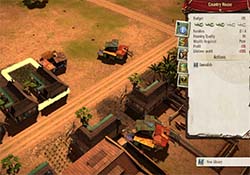
Citizens like to build shacks,
even with available housing nearby.
I also had trouble figuring out why citizens were building shacks instead of moving into my Tenement buildings. After some trial-and-error and consulting Reddit, I discovered that it was probably a result of the Tenement not being close enough to the places where the citizens were working. But this commute range isn't labeled or drawn anywhere, so it's hard to tell whether your housing is close enough.
There are similar problems with happiness buildings and other area effects, since their effective range isn't labeled anywhere. The game uses ambiguous terms like "in the vicinity" or "nearby buildings".
Do these terms have different in-game meanings? Or are they used interchangeably? What do they mean? Do they mean the buildings have to be adjacent? Do they have to be a couple city blocks away? 10 city block? Or does it just mean that they function as far away as people are willing to travel to use their services? If so, how far are people willing to travel? How do I know how far they will travel?
I also get occasional notifications that my resource and industry buildings aren't producing because they don't have enough storage capacity. But I haven't yet figured out where stockpiles are stored or how to expand capacity. I assume the goods sit at the docks waiting for a trade ship, but the dock building doesn't say anything about having a capacity. I'm still playing around with it.
So why isn't my factory producing, even though the panel says it is receiving resource inputs? Why aren't my goods being sent to the docks to be traded away, even though I have five building producing them? Perhaps building more docks will resolve the problem? Why is only one building ever being constructed at a time, even though I have five construction offices? Do I need more teamsters? Again, the game doesn't explain.
Eventually, with enough practice, you'll learn how to keep your citizens housed and happy through trial and error. But the learning curve is unusually high, even for a game in a genre as complicated as city management.
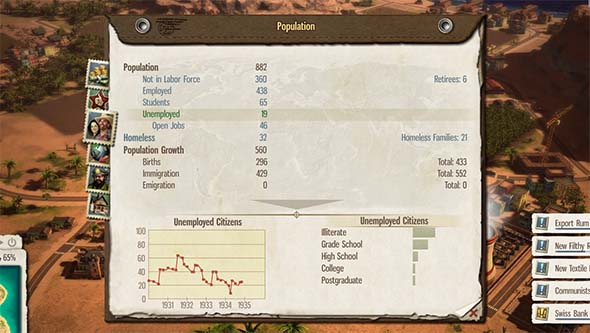
The information that is provided by the info widgets is detailed and has high granularity.
That isn't to say that the interface is terrible. It's just different and a is missing a few important items. In the places where the menus do provide information, it is always very detailed. The unemployment report breaks down the numbers of unemployed by their education level, so that you know exactly what kinds of jobs to focus on. The homeless report is broken down by income level so that you know exactly what level of housing to build. And a few other reports have similarly useful charts and statistical breakdowns.
Every menu contains hyperlinks that can be clicked in order to drill down to more specific details about the relevant item. This goes all the way down to individual buildings and citizens! And since every citizen is fully simulated in the game world, you can track specific citizens to find out where they live, where they work, and what services they use. So that is one way to figure out why stuff isn't working. But it's not possible or practical to follow every citizen around to find out what services they're using.
Building a dynasty for your city-state
At the start of a new game, you create and name your dictator's dynasty and create an avatar for your dictator. This dictator can even have children, which can be given skills and assigned to manage various buildings to improve their effectiveness or provide other bonuses. By stashing away money in your Swiss bank account, you can also level these dynasty members up to further improve their bonuses.
While you can jump right in to a city with the sandbox game mode, the primary mode is a mission-based campaign. This campaign will guide you through the eras with a set of missions that gradually tutorialize you on the new features as they are unlocked. But the campaign missions aren't that much different than the sandbox mode, except that it keeps stopping you when you hit the mission objective. Then when you go to the next mission, you can pick up where you left off. You also have to replay parts of certain eras with different objectives - I think there's two or three missions in each era.
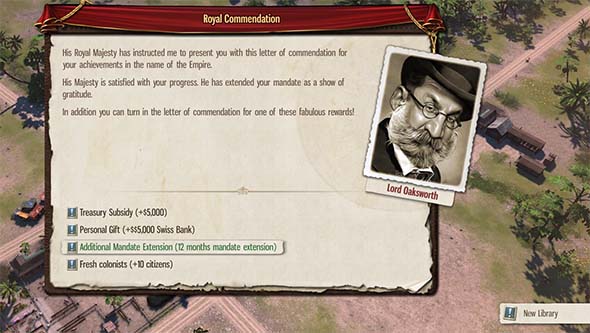
Missions can be offered throughout the game that act as pseudo-tutorials.
They give bits of advice on what to build or do next, and offer various rewards for completion.
I'm not sure if this is a glitch or not, but the campaign kept making me toggle between two different islands. I think this was to make it less tedious to have to replay an era, since you don't have to play two missions on the same island in a row.
But the downside is that when you switch to the other island, you don't necessarily have all of the infrastructure from the previous era, since it wasn't necessarily relevant to the last mission you played on that island. So you end up having to play catch-up, which drags the game out longer than it needs to be. It also makes it harder to plan out your city, since you may forget your expansion plans for one island while you're doing a mission on the other island.
The missions also end very abruptly, so you might have been in the middle of building something and not get to finish it. This can potentially put you in a bit of a hole when you start the next mission, but it's usually not hard to overcome it - assuming that you remember what you needed.
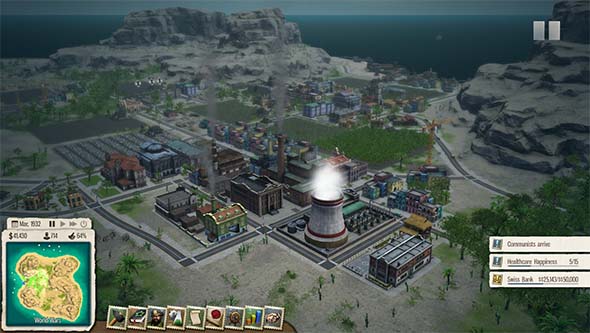
During the campaign, you may have to rebuild infrastructure from the previous era
if you failed to build it during the previous mission on that island.
I also wish that the multiple islands in the campaign felt more like they were part of a singular country - as if you ruled over an island chain and situations on each island required your direct attention. Instead, it just feels like you're playing the same game twice. The only thing that carries over between the islands of the campaign is the dynasty members and your Swiss bank account. The islands' economies (as far as I can tell) are completely disjoint, and they can't even trade with each other.
And since the same two cities are used for all missions in a campaign, any early planning or strategy mistakes that you make can come back to haunt you later. Sometimes, they can dramatically compound problems later on. But since the game doesn't provide useful tips for planning ahead, it's very hard to avoid these pitfalls on a first playthrough. This leads to some dramatic spikes in difficulty in the later missions of a campaign. This can be very frustrating, since you don't want to go back and restart the whole campaign in order to better plan out your cities.
One clever design element though, is that the second half of the campaign starts back in the colonial era with two new islands, but adds some additional challenges that you didn't face the first time around. This allows you to take anything that you might have learned from the first half of the campaign, and apply it to your early city planning and strategies.
Tongue-in-cheek dictating
Because of the subject matter, it is a good thing that this game's tone remains very tongue-in-cheek. It doesn't really take anything seriously, so you don't have to feel too bad about repressing your citizens or killing dissenters in order to bolster your approval rating. This is good, because a more serious approach would probably make the game too dour to be fun.
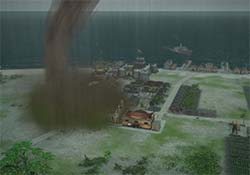
Natural disasters occur suddenly and
without warning, and last forever.
The game even finds humor in natural disasters, as your advisor apologizes for being such a poor weatherman. These disaster occur very suddenly and without warning. And, like revolts and military skirmishes, they go on for too long and don't pause the flow of time. It's fine when the disaster is a monsoon or drought, but it's annoying watching the time tick by as a tornado goes on for three in-game months!
The humor falls flat quite frequently. It lacks the subtle cleverness that is Maxis' trademark (The Sims and SimCity developers), so the humor doesn't elevate the game.
To make matters worse, the humor can actually be detrimental. Advisors often make jokes about events that occur on the island instead of offering useful information or advice when things go bad. Building and edicts also have [attempted] humorous descriptions instead of providing useful information about what they actually do.
The novel concept makes this series worth trying out for someone who needs a diversion from mainstream city-building and strategy games. Tropico 5 is competent enough to be more than just a novelty game, and the little world that it creates is very alive and organic. It's limited scope, however, can railroad the player a bit, and so this game definitely won't monopolize my time in the way that SimCity 4 did years ago.
This little Cuba-simulator is a fun diversion, but not much more.
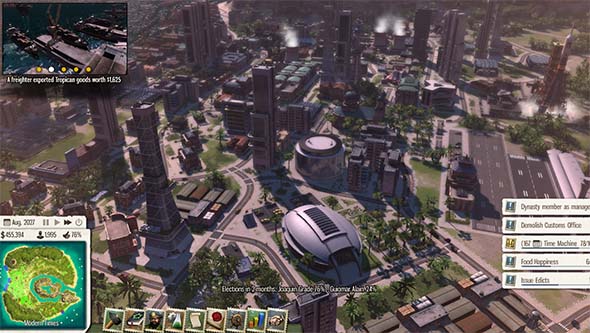
By the end of the game, you'll have gone from a plantation and mining colony to a modern metropolis.